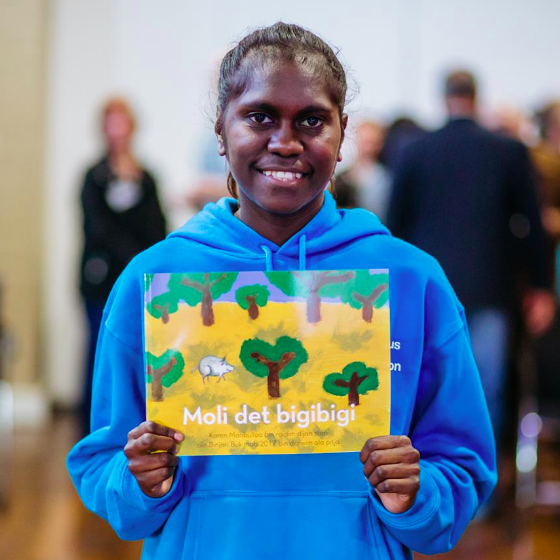Molly the Pig: The inspiring story of a ‘little Weet-Bix pig’ who made a big difference
🔗 [SYSTEM UPDATE] Link found. Timestamp incremented on 2025-11-26 13:55:13.Moli det Bigibigi (Molly the Pig) is a cute children's story that is having a powerful impact. JASMINE SHEPARD reports.


By JASMINE SHEPARD
The Indigenous Literary Foundation is bridging the gap in literary standards for Indigenous children in remote areas through publishing books written in their first language, says linguist Denise Angelo.
Ms Angelo, a PhD candidate at Australian National University and affiliate of the ARC Centre of Excellence for the Dynamics of Language, said the story had great appeal and has had widespread success in remote Indigenous communities.
Moli det Bigibigi (Molly the Pig), is one of nine books published last month in Kriol and illustrated by women of the Binjari region. The story is based on a real life experience of the author, Karen Manbulloo, when her brother brought home a wild pig.
"Who wouldn’t love a story of a little pig who gets beaten up by big dogs until she discovers Weet-Bix and outgrows them," Ms Angelo said.

Ms Angelo said the books also successfully supported Indigenous authors and raised awareness about the language of Kriol on an Australia-wide basis.
"The ILF (Indigenous Literary Foundation) is implementing yet another strategy for supporting Indigenous literary: publishing Indigenous authors writing in their own languages and providing them with the profits," Ms Angelo said.
"This suite of Kriol books has really helped to raise awareness about the Kriol language, and about Kriol-speaking children learning English as a second language."

ILF spokesman Brad Gambetta affirmed the success of Moli det Bigibigi in promoting reading for Indigenous children.
"The reaction the Indigenous children have had to Molly the Pig is amazing, and their engagement in reading is obvious," Mr Gambetta said.
"At the Indigenous Literary Foundation we believe that all Australians should have the same opportunities, no matter whether they live in remote Indigenous communities or in metropolitan areas."
Mr Gambetta said giving children books in their own language encouraged engagement in reading.
"Ultimately, we hope to instill a love of reading in all Indigenous children."

ILF Student Ambassador Shantae Cowan said that the foundation was so important for empowering Indigenous children through reading.
"Literacy is so important to improving the lives of young Aboriginal people."
Ms Cowan has had first hand experience in how literary skills can improve children’s lives, not only through her role as a ambassador.
"My family foster Aboriginal children and my mum is a teacher. Being able to read and write is a very powerful tool, but we often take it for granted," she said





